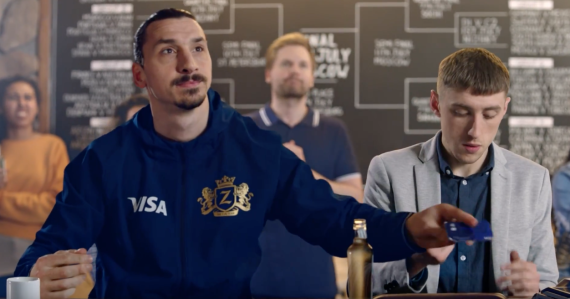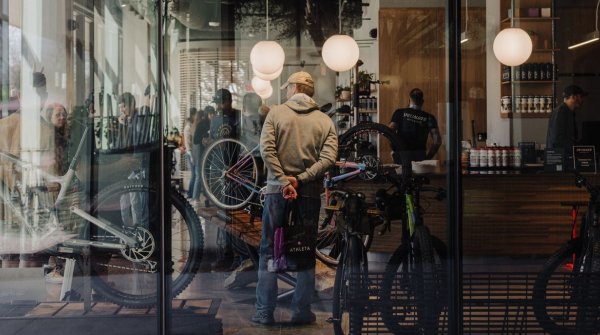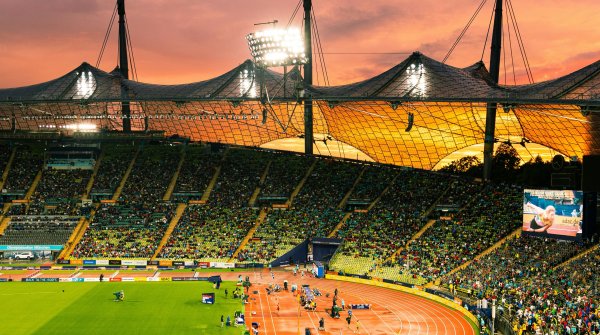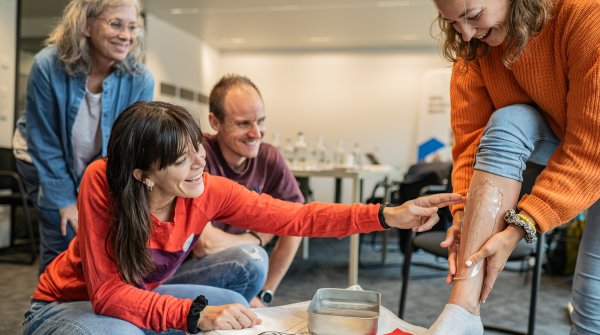
Zlatan Ibrahimovic is coming to Russia for the World Cup. But “Ibra” isn’t in on the mega event as a player; instead, he’s an ambassador for the World Cup sponsor Visa. “Visa is innovative. Zlatan is innovative. Together, we’ll help make sure fans don’t miss a moment of the World Cup,” says Ibra. He’s meant to mingle with fans, to maximize the advertising value for the global payment processor.
In the end, Visa is said to have paid 32 million euros each year to be able to call itself a FIFA Partner. The highest (and most expensive) category of backers for the global soccer federation includes, in addition to Visa
- Adidas
- Coca-Cola
- Gazprom (a Russian natural gas company)
- Hyundai/Kia
- Qatar Airways
- and Wanda (a Chinese enterprise group).
The seven partners are permitted to advertise not just at the World Cup, but also at other world championship events. The Premium category, which can include a maximum of eight companies, is thus almost fully booked. In contrast, there are still major gaps in the other two classes of FIFA’s new, three-tiered sponsor concept.
Yet four years ago, at the 2014 World Cup in Brazil, all 20 sponsor packages were sold out long before the beginning of the highlight. But the 2015 corruption scandal, including the arrest of high-ranking officials, has done serious damage to FIFA’s reputation. Global companies like Emirates, Sony, Castrol, Continental, and Johnson & Johnson have bowed out to avoid suffering any image damage.
Adidas pressed on to further changes in FIFA, remaining on as a sponsor. Ultimately, twelve of the 32 participant countries are outfitted elsewhere. “When soccer is played, the world watches,” says CEO Kasper Rorsted. “The World Cup is our greatest visibility for our brand – that is still true.” Also contributing to the sponsor problems is the change in FIFA’s marketing concept. In the second category, the “FIFA World Cup Sponsors,” only five of the maximum eight spaces have currently been sold.
- McDonald’s
- Budweiser
- Hisense
- Mengniu Group
- Vivo
are each paying between 8 and 20 million euros to also be able to advertise at the World Cup and the Confederations Cup.
Notable is the rapidly growing number of Chinese companies (including Wanda, Hisense, Mengiu, and Vivo) paying millions to advertise at the World Cup – China has less of a problem with FIFA’s corruption issues. The country also aims to apply to host the 2030 or 2034 World Cup. Chinese companies pay 835 million dollars, the bulk of the 2.4 billion spent on advertising for the World Cup.
The football shoes of the German World Cup stars in pictures
FIFA’s biggest problem is with its so-called Regional Supporters. This has 20 spaces, four for each of the major continental regions of the world. Only eight packages have been sold so far, the majority with gracious support from Russian president Vladimir Putin.
Hardly anyone outside of Russia will be familiar with the European Regional Supporters Alfa (bank), Alrosa (diamond producer), Rostelecom (telecommunications), and railroad company Russian Railways. Chinese scooter manufacturer Yadea was the first company to acquire rights for the Asian market. Just a few days before the World Cup came Luci (technology and entertainment) and Diking (apparel), also from China. No packages have been sold thus far for the regions of North and Central America and South America .
Only shortly before the beginning of the World Cup did FIFA land the first regional sponsor from Africa with Egypt. The North African country wants to advertise its tourism regions, and is the first new sponsor of the past five years not from Russia, Qatar, or China.
The World Cup should also get plenty of attention this year: A total of three billion fans worldwide tuned in to the 2014 games in Brazil, with nearly 700 million viewers for the final between Germany and Argentina alone. Add to that the several millions at public viewings, receiving the advertising messages of Zlatan Ibrahimovic and co. on the advertising boards and in commercials.
 Sports BusinessThe future of the bike industry: 6 innovative bike stores
Sports BusinessThe future of the bike industry: 6 innovative bike stores
- ISPO awards
- Mountain sports
- Bike
- Design
- Retail
- Fitness
- Health
- ISPO Job Market
- ISPO Munich
- ISPO Shanghai
- Running
- Brands
- Sustainability
- Olympia
- OutDoor
- Promotion
- Sports Business
- ISPO Textrends
- Triathlon
- Water sports
- Winter sports
- eSports
- SportsTech
- OutDoor by ISPO
- Heroes
- Transformation
- Sport Fashion
- Urban Culture
- Challenges of a CEO
- Trade fairs
- Sports
- Find the Balance
- Product reviews
- Newsletter Exclusive Area
- Magazine



























